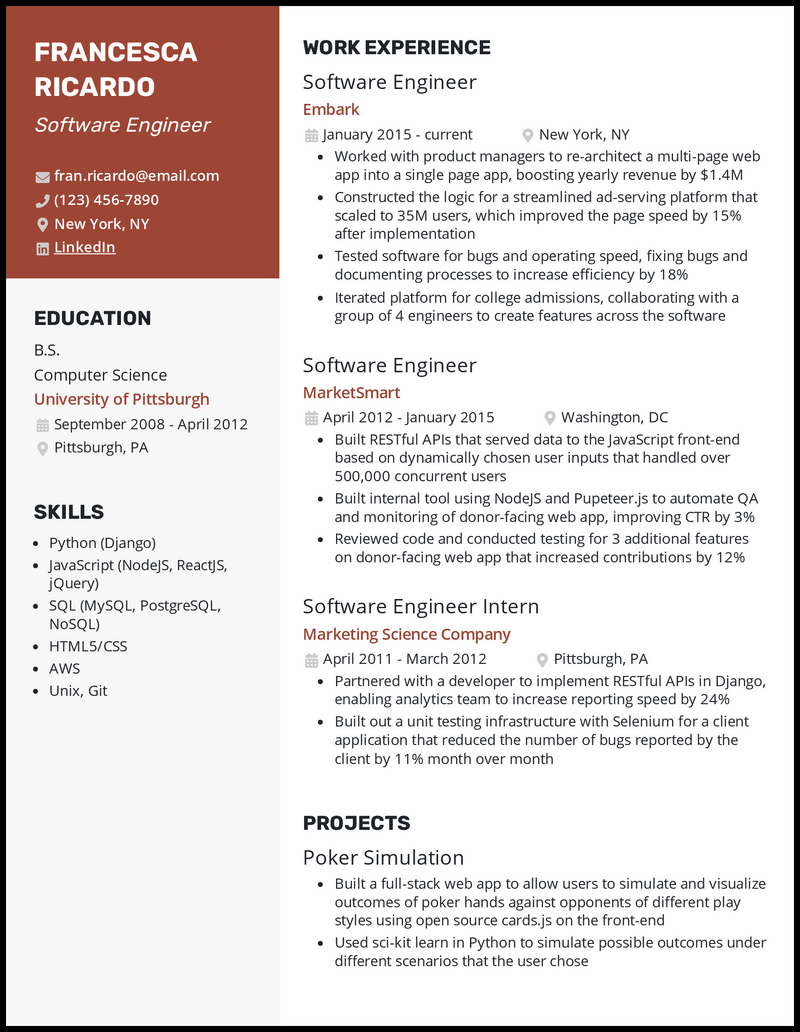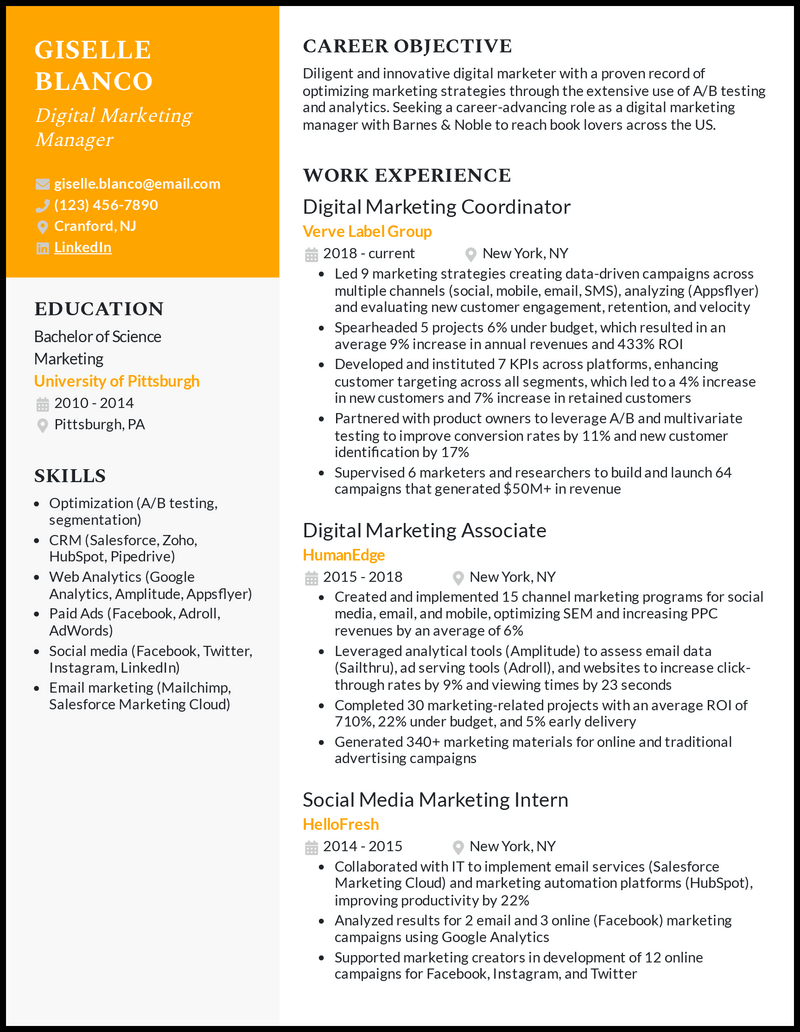In 2026, skills-based hiring and AI fluency are earning people jobs where college degrees have traditionally won out. When it comes to your resume skills, the more specific you can be, the better.
Resume skills are the knowledge and tools you list on your resume to show employers you can perform the role well. They greatly help hiring managers (and ATS systems) quickly understand your best strengths and decide whether you should go to the interview round.
That’s why we give you:
↪ a look at the skills employers generally might be wanting right now
↪ a list of the most in-demand job skills by career type,
↪ and 150 of the most sought-after and widely applicable skills you can put on your resume (like this one) in 2026.
Top Skills to Put on a Resume and Stand Out

While we’re going to give you plenty of job-specific resume skills you can add to your AI cover letter and resume, there are some that work across just about any field. These can add value for candidates who either lack work history or are creating an entry-level resume.
- Data Analysis
- Problem-solving
- Collaborative
- Detail-oriented
- Adaptable
- Creative
- Written Communication
- Public Speaking
- Critical Thinking
- Bilingual
- Multi-tasking
- Organized
- Interpersonal Skills
- Time Management
- Accountable
- Leadership
- Results-oriented
- Project Management
- Budgeting
- Compassionate/ Empathetic

Skills to put on resume with no experience
A resume with no experience should have abilities you’ve gained from schoolwork, projects, volunteering, part-time jobs, or daily life. Ideally, they will convey that you can perform the core tasks of the role with the right tools/knowledge.
What types of skills should you include?
As an entry-level applicant, your no experience resume must include a mix of:
- Transferable Skills:
- Problem-Solving
- Time Management
- Project Coordination
- Academic Skills
- Report Writing
- Data Presentation
- Research & Analysis
- Personal Skills
- Professionalism
- Bilingual (if you are)
- Adaptability
- Digital Skills
- Generative AI (ChatGPT, Gemini, Copilot)
- Documentation Tools (Notion, Confluence, Slite)
- Google Workspace
How to choose skills when you have no work experience?
Follow these simple steps to choose the right skills if you have no experience:
- Read the job description: Check for repeated keywords and required tools.
- Match 5–8 skills you have: Include skills you’ve used in school projects, volunteering, tutoring, clubs, etc.
- Give proof of their use: Use your work experience to directly mention all skills once. It’s best to highlight a unique impact you created with each skill.
How to use skills in a resume with no experience:
- Led a 4-person class project in Trello, gaining positive feedback from 97% of professors.
- Promoted a charity event on Eventbrite, boosting annual ticket sales by $1.2k.
- Created a knowledge base in Slite, shortening information-search time for classmates by 6 minutes on average.
Hard Skills vs. Soft Skills
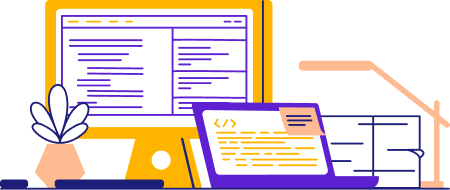
Before we jump into which skills to put on your resume, we need to get some definitions out of the way:
- Hard skills are the tools and software you use to get your job done. Excel and QuickBooks are examples of hard skills.
- Soft skills are those that are hard to measure or prove expertise in. “Communication” is a textbook example of a soft skill.
Quickly distinguish between hard and soft skills by asking, “Is there a specific tool or software associated with the skill?” If “yes,” you’re likely dealing with a hard skill. If not, you’re talking about a soft skill.
As we explained earlier, companies often use an ATS to filter out job applicants based on whether they include the right skills on their resumes.
The ATS filters are looking primarily for hard skills; they want to be sure the people they end up hiring know the right tools and software needed to succeed.
This doesn’t necessarily mean you should exclude soft skills from your resume. Why? After the ATS scans your resume, it’s passed on to the human hiring manager. They’ll likely want to see soft skills depending on the kind of industry and role you’re applying to.
Try out this quick guide to determine whether to put soft skills on your resume:
Should I include soft skills on my resume?
If you answer “yes” to any of these questions, you should likely include soft skills on your resume (we’ll detail how in the next section).
- Is the role I’m applying to largely non-technical?
- Technical roles are those primarily dominated by hard skills (software engineering, data science, accounting, etc.)
- Can I demonstrate how I used my soft skills in past roles?
- Just listing soft skills on your resume isn’t as impactful as showing how you used them to do your job.
- Are there obvious soft skills I need to do my job well?
- For example, if you’re in sales or customer service, you need the ability to communicate persuasively with customers!
Examples of hard skills according to industry
- Predictive Modeling (Finance)
- eQUEST (Energy)
- Crop Rotation (Agriculture)
- eZee Frontdesk (Hospitality)
- Google Classroom (Education)
- SQL (IT)
- X-ray Diagnostics (Healthcare)
- Mailchimp (Marketing)
- AutoCAD (Engineering)
Examples of soft skills
- Flexible
- Self-starter
- Written Communication
- Conflict Resolution
- Analytical
- Diplomatic
- Time Management
- Attentive to Details
- Problem-solving
How to List Skills on Your Resume (And Impress Employers)

Now that you know whether you should put hard skills, soft skills, or a combination on your resume, how do you actually include them?
- When it comes to your resume skills, the presentation can matter just as much as the content!
- Before we get to structure, a word of warning:
Don’t list too many skills in your skills section! While it’s all right to dump all sorts of skills into your resume outline, it’s a big red flag to the hiring manager if they see a resume where an applicant lists 15+ skills.
First, it might mean the applicant is exaggerating their skillset (a big no-no). Second, a hiring manager would rather hire someone who’s a master of a few skills than a novice in many.
Different resume formats may display your skills in various ways, but regardless of the layout you choose, there are three places you should mention your most important skills:
- In your resume objective or resume summary (if you include this section)
- In a dedicated “skills” section on your resume
- In your work experience or projects (show how you used your skills to do your job)
Your resume objective should only be two to three sentences, so you should include your top one to two skills most relevant to the job you’re applying for here. In addition to our objective sample below, we’ve got plenty more great examples of how to mention your best skills in your resume objective or resume summary.
Organized, considerate administrative assistant with a history of remaining cool under high-pressure situations where multiple priorities are managed. Genoa Telepsychiatry is doing invaluable work for underserved housing populations, and I would be an asset in enabling Ms. Garcia to focus on that mission by alleviating her organizational burden.

How to organize skills on your resume
When it comes to skills for a resume, there are a couple of ways you can structure them:
- By skill category (technology type, soft skills vs. hard skills)
- Experience level
These kinds of breakdowns aren’t mandatory. You can just list all of your skills in your skills section, provided you keep the number to under 10.
First, you can break up your skills by category. This is most appropriate if you’re applying for a technical role since you can group different technologies you use by type.
For example, as a data analyst, you might want to divide your skills by the different facets of your job (programming, modeling, and data visualization).
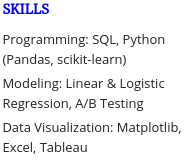
This breakdown of your skills can also work well if soft skills are your biggest strength. For example, you can chunk your soft skills into categories like leadership, customer service, communication, etc.
Another way to classify your skills on your resume is by your experience level. Convey your expertise either in terms of years of expertise with that skill or by a rating you choose (beginner, intermediate, expert, for instance).
Here’s an example of this skills breakdown in action:

And again, you can also just list all of your skills without categories like the example below if there are fewer than 10:
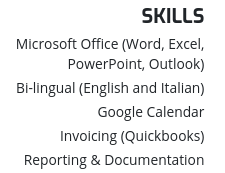

How to let your work experience vouch for your job skills
Now that you’ve got your top one to two skills in your resume objective and a dedicated skills section, it’s time to talk about how you’ve used your skills in your previous roles and projects.
This is especially important for soft skills. Put yourself in the shoes of the hiring manager.
Does seeing that someone described themselves as “attentive to detail” in their skills section mean much without seeing that skill in action?
It’s much more valuable if you highlight a time you were attentive to detail in a previous job. So, if you’re an administrative assistant, you might say you “re-organized thousands of customer contacts in HubSpot without losing any customer data.”
Remember, it’s one thing to say you have a skill, but showing your knowledge of that skill in a work or personal project carries far more weight in the eyes of the hiring manager.
Let’s make this practical with an example: This software engineer lists NodeJS and Django in her resume skills list.

This won’t be the last we see of these skills, though. Take a look at this job seeker’s work experience at MarketSmart. For instance, see how she weaves NodeJS into improving CTR? And even her intern experience shows how Django played a role in increasing reporting speed.

Pro tip: Try starting with specific work experience and then work backward to determine which skills you used instead of the other way around.
Regarding technical skills, try to be specific about what you did with the tool/ software you’re describing. Microsoft Excel is a program that can be used for many different applications, for example. Discuss specifically which functionality you used to accomplish your task (pivot tables, vlookups, etc.).

How to match your resume skills to the job description
How can you identify the most common skills for the industry or role you’re applying for? The best way is to look at job ads for positions that grab your attention.
Try this two-step process to list skills on your resume:
- Look across 5-10 different job descriptions for roles you’re interested in and identify the 10-15 most common skills in those job listings.
- For each specific role you apply to, choose the 5-7 skills from your list that are most relevant to that job.
Generating resume skills with AI can help vault you into the top five percent of applicants and increase your chances of interviewing.
Let’s walk through an example of how to customize your skills for a specific job.
Say you’re looking for a position as a digital marketer, and after looking at some job descriptions, you notice the most common skills employers are looking for are the following:
- CRM: HubSpot, Salesforce, Microsoft Dynamics, Pipedrive
- Web Analytics: Google Analytics, Adobe Analytics, Mixpanel, Heap
- General Tools: Microsoft Excel/ Word/ PowerPoint, Google Sheets/ Docs/ Slides
- Optimization: A/B testing, customer segmentation, attribution modeling
- Paid Ads: Facebook, AdWords, LinkedIn, Google Display Network, retargeting
- Social Media: Twitter, Instagram, Facebook, LinkedIn
- Email Marketing: Mailchimp, ConvertKit, Drip
- SEO: Content creation, keyword research, backlink building
Now, you’re specifically interested in a digital marketing role at Barnes and Noble with the following job description:
Digital marketing manager
ESSENTIAL FUNCTIONS:
- Develop and execute data-driven marketing strategies and campaigns with a strong focus on driving acquisition, engagement, and retention across multiple channels (e.g., SMS, mobile, email, social media, etc.) on time and on budget.
- Aim to generate revenue and deliver on key business objectives, ROI, and KPI targets.
- Own, measure, deliver, and optimize key metrics and reporting on marketing activities across channels and platforms.
- Identify trends and insights, optimize segments, spend, and performance based on data.
- Utilize strong analytical ability to evaluate end-to-end customer experience across multiple channels and customer touchpoints and work cross-functionally to drive qualified traffic, improve conversion, and identify new opportunities to boost user engagement and retention through A/B and multivariate testing.
REQUIREMENTS:
- Minimum 5-7 years of digital marketing experience with a minimum of 3 years demonstrated success in mobile, email, social media, PPC, and SEM marketing from concept to completion with a proven track record of success.
- Results-driven mentality with exceptional detail orientation and knowledge of metrics, A/B testing, and ROI analysis.
- Experience with testing and optimization platforms.
- Strong track record of distilling actionable insights from data to improve multi-channel marketing strategies.
- In-depth familiarity with email service providers and knowledge of marketing automation platforms.
- Solid understanding of website analytics tools (Google Analytics, Amplitude, Appsflyer), email systems (Sailthru, Salesforce Marketing Cloud), and ad-serving tools (Adroll, Facebook.)
Finally, we cross-reference our list of 10-15 skills with the skills this specific job is looking for (underlined above). This leaves us with the remaining five key skills:
- Optimization: A/B Testing, Segmentation
- CRM: Salesforce
- Web Analytics: Google Analytics
- Paid Ads: Facebook
- Social Media: Email Marketing
There you have it! These skills are what will make up your skills list for this specific role. Don’t forget to include the seemingly most essential skills in your resume objective (for this position, we’d say those are optimization and A/B testing) and mention relevant work experience where you used some of these skills.
Remember, it’s important to be truthful about which skills you know and which you don’t. A good rule of thumb is to ask yourself whether you’d be comfortable being interviewed about a skill. If the answer is “yes,” then include it. Otherwise, it’s best to leave it off your resume.
And for the grand finale to this digital marketing example: Check out how this resume integrates key skills into the career objective, skills section, and work experience.
Why this resume works
- Giselle’s digital marketing manager resume is tailor-made for Barnes & Noble. How? Skills motivate every section of her resume.
- Starting with the most obvious section—the skills section—Giselle lists skills important to Barnes & Noble, grouping them in easy-to-read categories.
- Even though the job description asks for knowledge of Sailthru, Giselle doesn’t have this experience. Instead, she lists other email marketing skills, such as Mailchimp.
- Don’t be deterred, even if you lack experience in an area or two! Demonstrating a willingness to learn is highly valuable.
- The work experience section is a prime opportunity to showcase skills in action. Like Giselle, start with active verbs to show how you used skills, software, and tools to impact the company positively.
Job-Specific Resume Skills
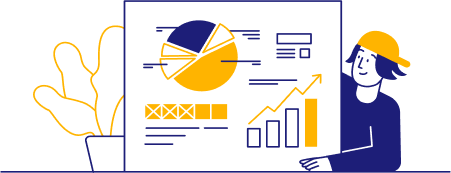
We promised an extensive list of resume skills, organized by profession, and we’re not ones to break our promises!
Below, you’ll find countless role-related skills you can put on your resume, along with informational tidbits for each profession.
Remember that honesty is critical when you build a resume, so we stand behind a shorter list of genuine skills rather than a slew of half-truths you’ll blush over later in an interview.

Web developer skills for your resume
Web developers build the web apps we interact with in our everyday lives. From banking to transportation to Netflix, it’s hard to find a facet of life that isn’t touched by web development.
We did an extensive analysis of the top web developer skills employers are looking for in 2026, and below are the results in order of those most in demand.
Top web developer skills
- JavaScript (React, Angular, Vue)
- SQL (MySQL, PostgreSQL, SQL Server, Oracle)
- HTML
- CSS
- NoSQL
- APIs
- Cloud Storage (GCP, AWS, Azure)
- Git
- Java
- Python
- C#
- PHP
- Ruby

Data analyst skills for resume
Companies are currently swimming in large pools of data. Marketing, product, engineering, and executive teams all rely on data to make the most effective decisions in the face of uncertainty.
That’s where data analysts come in. To be a successful data analyst, you need the right skills to clean, organize, visualize, and make actionable recommendations from data.
We analyzed over 100 job openings and determined the most in-demand data analyst skills needed to get a data analyst position in 2026. Below are the results in order of the most popular skills.
Top data analyst skills
- SQL (MySQL, PostgreSQL, SQL Server, Oracle)
- Business Intelligence Tools (Tableau, PowerBI, Qlik, Looker)
- Excel/ Google Sheets
- Python (Pandas, Matplotlib, Scikit-learn, Numpy)
- R (Dplyr, ggplot2)
- SAS
- Java
- ETL
- Git
- Statistics
- NoSQL

Marketing skills for resume
No matter how great a product or website—unless a successful marketing campaign drives customers to that product, it won’t succeed.
Marketers must strike a balance between creativity and science to reach the right people at the right time to make them customers.
To do this successfully, marketers need a wide range of skills.
Top marketing skills
- CRM: Salesforce, Microsoft Dynamics, Pipedrive, HubSpot
- Web Analytics: Adobe Analytics, Mixpanel, Heap, Google Analytics
- General Tools: Google Sheets/ Docs/ Slides, Microsoft Excel/ Word/ PowerPoint
- Optimization: Customer Segmentation, Attribution Modeling, A/B Testing
- Paid Ads: AdWords, LinkedIn, Google Display Network, Retargeting, Facebook
- Social Media: Instagram, Facebook, LinkedIn, Twitter
- Email Marketing: ConvertKit, Drip, Mailchimp
- SEO: Keyword Research, Backlink Building, Content Creation
- Direct Mail

Customer service skills for resume
When a customer has a problem or a question, they need to get a prompt and accurate answer to ensure they remain a customer.
More than that, a strong customer service representative will build relationships with customers to help identify potential new features or directions to take a product.
To do this successfully, you need a potent blend of people skills while also knowing the tools of the trade.
Customer service resume examples ![]()
Top customer service skills
- Bilingual
- Strong Communication & Interpersonal Skills
- Curious, Empathetic, and Professional
- Willing to Learn
- Multi-tasking
- Organized
- Goal-oriented
- Problem-solving
- Data Analysis
- Enterprise Software
- Experience with Business Processes
- Detail-oriented
- Microsoft Excel
- Zendesk, HubSpot, Helpscout

Management skills for resume
No matter how effective a person is as an individual contributor, management is an entirely different job that requires an altogether different skill set.
To be an effective manager, you must first understand and relate to your employees while ensuring company initiatives are hit on time. To get this done, you need a mix of different skills.
Top management skills
- Financial Analysis
- Time Management
- Leadership
- Self-motivation
- Conflict Resolution & Management
- Managing Career Growth
- Performance Reviews
- Accountable
- Bilingual
- Ability to Motivate
- Foster Team Environment
- Multi-tasking
- Ability to Work Under Pressure
- Result-driven

Accounting skills for resume
Accountants are the unsung heroes of any well-oiled company. A company is only as successful as it can demonstrate through its financial reports.
Accountants need to be wizards with reporting and data while maintaining a culture of rigorous organization. Accounting is a field that requires knowledge of particular hard skills.
Top accounting skills
- Financial Reporting
- General Ledger Accounting
- Quarterly Close Processes
- Quarterly Financial Statements
- Auditing
- Tax Accounting
- GAAP Accounting Principles
- Expense Reporting
- QuickBooks
- Microsoft Excel
- Accounts Payable & Receivable
- Account Reconciliation
- Compliance
- Data Analysis

Project manager skills for resume
Project managers keep the trains on the rails. To be a successful project manager, you must know how to ensure deadlines are met on time and on budget.
In this role, you’ll need the ability to communicate with diverse teams and technical knowledge to help engineers remove roadblocks they encounter that will prevent them from getting their job done.
Project manager resume examples ![]()
Top project manager skills
- Project Management Software (Jira, Trello)
- Microsoft Office/Google Suite (Excel/Google Sheets, PowerPoint/Slides)
- Project Management Frameworks and Methodologies (Agile, Scrum, Waterfall, Kanban)
- Programming Languages and Frameworks (JavaScript, Node.js, Python, Django)
- Data Analysis
- CRM Experience (HubSpot, Salesforce)
- Digital Marketing
- Budgeting
- Reporting
- Planning
- Problem-solving
- Scheduling

Sales skills for resume
An effective salesperson can form meaningful relationships with new sales prospects very quickly.
To be able to sell a new customer on your product or tool, you first need to intimately understand their pain points and what they’re trying to solve.
In addition to solid soft skills, you need to know the technical tools to track and manage prospects through the sales pipeline.
Top sales skills
- Strong Communication
- Negotiation
- Results-oriented
- Empathetic
- Reporting
- CRM (HubSpot, Salesforce)
- Written Communication
- Presentation Skills
- Problem-solving
- Persistent
- Resilient
- Lead Generation (LinkedIn, Email)
- Microsoft Office (Word, Excel, PowerPoint)
- Time Management

Administrative assistant skills for resume
When it comes to a career as an administrative assistant, there’s no skill more valuable than organization. How can you help others be at their best without ensuring all ducks are in a row?
Of course, other skills are needed to succeed as an administrative assistant, and we’ve analyzed numerous administrative assistant job openings to determine the most in-demand skills for this career.
Administrative assistant resume examples ![]()
Top administrative assistant skills
- Microsoft Excel/Google Sheets
- Microsoft Word/Google Docs
- Microsoft PowerPoint/Google Slides
- Financial Reporting
- Scheduling
- QuickBooks
- Scheduling (Microsoft Outlook/Google Calendar)
- Words per Minute you Type
- Languages you Speak
- Database Management
- CRM (Salesforce, HubSpot)
- Detail-oriented
- Personable and Welcoming
- Organized
- Multi-tasking

Nursing skills for resume
The value of nurses in our society has never been more apparent than during the COVID-19 crisis.
A good nurse must have a rigorous understanding of the medical procedures and documentation they need to complete while also maintaining the soft skills necessary to build trust and understanding with patients.
It’s a very tricky balance to strike. To help you pursue a new job in nursing, we compiled the most popular skills employers are looking for across a wide range of nursing disciplines.
Top nursing skills
- EMR Systems
- Ambulatory Care
- Emergency Care
- CPR Certified
- Best Practices
- Long-term Patient Care
- Compassionate
- Organized & Reliable
- Problem-solving
- Infant & Child Care
- Eldercare
- Medical Documentation

Teacher skills for resume
With the shift to remote learning due to the COVID-19 pandemic, the skills required to be an effective teacher from afar are also changing.
Teachers now need to be more in tune with the technologies used for remote learning to reach students.
Still, there are some skills required to be a great teacher that haven’t changed. Based on our analysis, here are the top skills schools want when they hire teachers.
Top teacher skills
- Lesson Planning
- Blackboard/Moodle
- Google Apps (Gmail, Sheets, Slides)
- SMART Boards
- Remote Teaching (Zoom)
- Safe, Supportive Classrooms
- Accountability
- Communication with Parents and Students
- Organization
- Conviction
- Problem-solving
- Focused on Student Performance
- Analytical

Software engineer skills for resume
Software engineer is a broad, all-encompassing term. There are hundreds of specific disciplines within this umbrella that require different skills.
Still, there are fundamental and common skills that all developers must have. First and foremost, you need to be able to program!
We collected the most in-demand skills for software developers to help you make the best resume possible.
Software engineer resume examples ![]()
Top software engineer skills
- Python (Django)
- Java (Spring)
- Ruby (Ruby on Rails)
- PHP (Laravel)
- JavaScript (Node, React, Vue, jQuery)
- SQL (MySQL, PostgreSQL, NoSQL)
- HTML5
- CSS
- AWS, GCS, Azure
- Unix
- Git

Business analyst (BA) skills for resume
Business analysts combine skills from many areas to help drive outcomes that materially improve a customer’s core metrics.
A BA is a great communicator, a robust data analyst, and an effective project manager. After a project is complete, the BA then has to be able to communicate the outcomes to the executive team.
Business analyst resume examples ![]()
Top business analyst skills
- SQL (MySQL, PostgreSQL, SQLite, SQL Server)
- Excel, Google Sheets
- PowerPoint, Google Slides
- Tableau, Looker, Chartio
- Python, R
- Salesforce, NetSuite, HubSpot, Pipedrive
- A/B testing, Linear Regression, Logistic Regression
- Project Management (JIRA, Trello)

Student skills for resume
When you’re a student, it can be challenging to know which of your skills you should highlight when applying for your first job or internship.
It varies depending on the position, but at this point in your career, hiring managers don’t expect you to be an expert in all the tools you’ll need for the job.
The key is to mention which skills you have some familiarity with and express an openness to learning on the job.
College student resume examples ![]()
High school student resume examples ![]()
Top student skills
- Data Analysis
- Microsoft Excel/Google Sheets
- Microsoft Outlook/Gmail
- Microsoft PowerPoint/Google Slides
- Hard-working
- Curious
- Problem-solving
- Studious
- Committed
- Social Media
- Driven
- Detail-oriented
- Collaboration
- Time Management

Data scientist skills for resume
Data scientists are hybrid programmers and statisticians. It can be tough to figure out which of your technical skill sets should be the focus of your resume.
Touch on your primary programming language and put context around the modeling techniques you use regularly.
After studying over 100 data scientist job openings, here are the top skills employers are looking for in these roles.
Data scientist resume examples ![]()
Top data scientist skills
- Python (Numpy, Pandas, Scikit-learn, Keras, Flask)
- R (Dplyr, Shiny)
- SQL (MySQL, PostgreSQL, Oracle)
- AWS (Redshift)
- Supervised Learning (Linear and Logistic Regression, Decision Trees, Support Vector Machines, Recommendation Engines)
- Unsupervised Learning (K-Means Clustering, Principal Component Analysis)
- Customer Segmentation, Price Optimization

Human resources (HR) skills for resume
When it comes to the skills you need to get your next job as a human resources manager, it’s important to demonstrate a combination of people skills (it’s in the job title, after all), but you also have to show command of the tools needed to get the job done.
You should demonstrate which phases of HR you have experience in. Whether that’s recruiting, benefits, compensation, or a combination thereof, these should be clear.
Human resources resume examples ![]()
Top human resources skills
- ATS (Workday, Jobvite, Greenhouse)
- Compensation & Benefits
- Payroll
- Performance Management
- HRIS
- Recruiting (Sourcing & Interviewing)
- Employee Onboarding
- Benefits Planning & Administration
- Employee Coaching
- LOA, FMLA, PLOA, Disability
- Microsoft Excel, PowerPoint
- Recruiting Coordination
- Compliance (OFFCP, FLSA, Unemployment)
- Employee Retention
- Management
- Organizational Strategy
- Labor Relations
- Succession Planning
- HR Analytics

Product manager skills for resume
Product managers help steer the direction of a company by working to understand new features and products customers are looking for.
A successful PM should have the technical skills to communicate fluently with engineers. They also need strong data analysis skills to determine whether new feature launches are working.
Product manager resume examples ![]()
Top product manager skills
- SQL
- Google Analytics, Adobe Analytics, Mixpanel
- Google Tag Manager
- Hotjar
- A/B Testing
- Optimizely, Google Optimize
- Basic Python scripting, APIs
- Agile, Scrum, Waterfall, Kaban
- Jira, Github, Confluence
- Google Analytics, Microsoft Excel

Recruiter skills for resume
Since recruiters are the first people prospective employees interact with in a company, they must have strong people skills.
Outside of that, a recruiter needs to be familiar with using an ATS to keep track of candidates as they go through the application funnel.
In addition, they need to know various tools to effectively source prospective candidates for a job opening.
Top recruiter skills
- Microsoft Excel, PowerPoint, Word
- HR Information Systems (Workday, Oracle HCM, Zoho, SAP)
- ATS (Greenhouse, Lever, Workable, Breezy HR, BambooHR)
- Sourcing Tools (LinkedIn Recruiter, TalentNest, Connectifier)
- Full Cycle Recruiting, Intakes, Sourcing, Screening, Evaluating Talent
- CRM (HubSpot, Marketo, Hootsuite)

Scrum Master skills for resume
As a Scrum Master, it’s vital you demonstrate which project management frameworks you have experience in on your resume.
Scrum Masters help ensure project deadlines are hit by establishing and monitoring incremental goals along the way.
Communication and management skills are must-haves, in addition to a few technical tools.
Top Scrum Master skills
- Agile Development & Best Practices
- Agile Frameworks—Scrum, Kanban, XP
- JIRA & JIRA Portfolio
- Microsoft Excel, PowerPoint, Project, Visio
- User Stories, ATDD, TDD, Continuous Integration, Automated Testing
- Project Planning & Scoping
- Problem-solving
- Data Analysis

Social media manager skills for resume
As the name implies, a social media manager must show prospective employers they can use social media to drive customers toward a business.
It’s not enough, however, to demonstrate experience with various social media platforms. You must also clearly understand data and analytics to prove that your campaigns can and will work for a business.
Social media manager resume examples ![]()
Top social media manager skills
- Instagram, Twitter, Facebook, Pinterest, YouTube, TikTok
- Sprout Social, Hootsuite
- Google Analytics
- Google Docs/Microsoft Word
- Google Sheets/Microsoft Excel
- Photoshop
- SEO
- Paid Social Media Advertising
- Data Analytics

IT manager skills for resume
IT managers need to possess razor-sharp technical skills while demonstrating the ability to mentor and guide employees under their leadership.
Since the number of potential technical skills an IT manager can have is vast, you must demonstrate a firm command of at least a few skills.
On your resume, it’s much better to demonstrate expertise in a few skills than a weak command of a large number of tools.
Top IT manager skills
- Software Development Life Cycle (SDLC)
- Agile/Lean Methodologies
- Jira
- APIs
- Network Infrastructure (DNS, DHCP, SSL)
- Linux/ Unix
- Security
- Python
- Java
- Project Management
- SQL
- AWS, GCS, Azure

Design skills for resume
As you might imagine, designers need to convince the hiring manager reviewing their resume of their creative ability. This is usually done via a portfolio.
Outside of your creativity, you also need to quickly and effectively communicate which tools you use to complete your design work. One of the first things a prospective employer will check is whether you have the technical skills they’re looking for in a designer.
Graphic designer resume examples ![]()
Top design skills
- Design Principles
- Typography
- Color Theory
- Adobe Creative Cloud (Photoshop, Illustrator, InDesign)
- Project Management
- Storytelling
- CorelDraw
- Sketch
- Canva, Vectr
- Adaptable
- Print Design
- Photography
Skills FAQs

Your skills should directly correlate with the job you’re applying for so recruiters can tell what makes you special at a glance. Refer to the job description for keywords or mission statements that show what the organization values and what the job role emphasizes. Prioritize skills that relate directly to your profession over those that could enhance your qualifications for other fields.
Try to limit your array of abilities to just 6 to 10 skills per resume. If you have more to choose from, choose to meet the optimal resume skill range with abilities that specifically answer the call of the job description. You don’t want a skills list that looks too “hodgepodge,” so hone your skills to a trade-specific edge that demonstrates your expertise.
Soft skills are the tools you use to socially function with grace and efficiency. They refer to your interpersonal abilities like negotiation, communication, and team delegation (just to name a few!). Keep in mind that you don’t want to overdo your skills list and appear disorganized, so select only the most relevant soft skills to list. You can use them as context for your professional experiences.
Technical skills, or hard skills, can refer to anything from software proficiency to specialized actions or tasks you can perform that relate to your job. Physical technology or machinery, digital meeting programs, and the ability to interpret industry-specific data all count! These important skills show off your specialties and highlight your unique candidacy for the job role.
Every skills list should be technical, but yours especially so: This is your opportunity to demonstrate your expertise instantly. By naming precisely which software programs you use (think: Adobe Photoshop, AutoCAD, or Salesforce to name a few) instead of generalizing, you effectively spotlight your skills ahead of time. Recruiters often skim the skills list first since they move fast, so seize the chance to align yourself with the job!
Honestly, that depends on you! Which of your resume sections is the strongest: skills, experience, internships, or stuff like your degree and academic achievements? Resume layouts with a side column can put your skills list in a highly visible space. If your experiences are super strong, you can also list your skills at the bottom of the page. Just make sure your best qualities are the most eye-catching!




